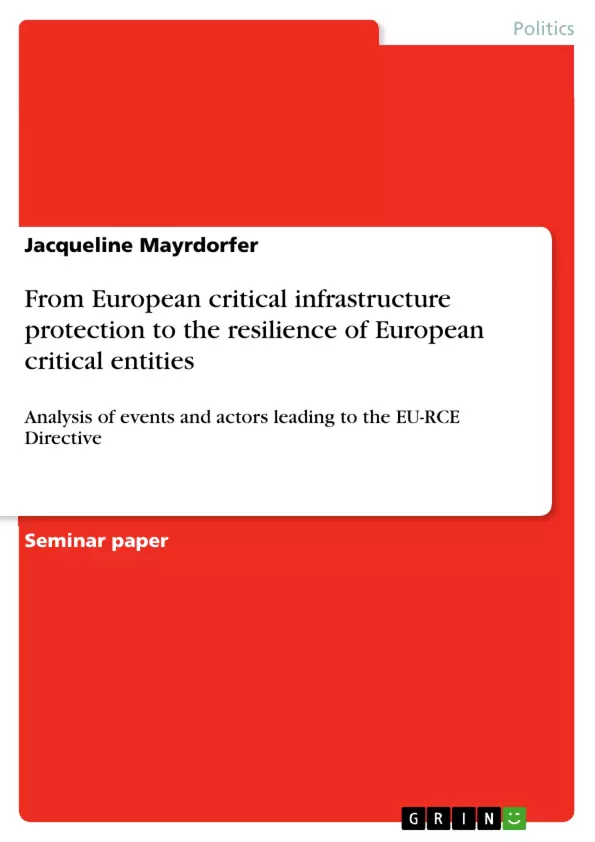In an era defined by interconnectedness and vulnerability, the security of critical infrastructure has become paramount. But how do nations transition from simply guarding these vital systems to building inherent resilience against evolving threats? This book delves into the intricate policy-making process behind the European Union's groundbreaking European Resilience of Critical Entities Directive (RCED) of 2022, a pivotal shift from a protection-focused approach to one emphasizing resilience in the face of increasingly complex disruptions. Through the lens of the policy cycle framework, the analysis dissects the journey from initial agenda-setting to the ultimate adoption of the RCED. Explore the shortcomings of the earlier European Critical Infrastructure Directive (ECID) that paved the way for reform, and understand how key stakeholders shaped the conversation. Uncover the core elements that define resilience in the context of EU law, examining how vulnerabilities were identified, and how essential services are now fortified against cyberattacks and other potential crises. This is more than just a historical account; it is a roadmap for policymakers, security professionals, and anyone concerned with the stability of our interconnected world, offering crucial insights into the challenges and opportunities of safeguarding critical infrastructure in the 21st century. Discover the vital role of stakeholder consultation and the redefinition of critical entities within this evolving landscape. The book offers an in-depth policy analysis of how the European Union is responding to modern threats, ensuring the continuity of essential services for its citizens, and shaping the future of critical infrastructure resilience on a global scale. It is essential reading for those seeking to comprehend the intricacies of EU policy, the importance of cybersecurity, and the proactive measures needed to protect the foundations of our societies. Keywords: Critical infrastructure, resilience, European Union, policy cycle, RCED, ECID, critical entities, cybersecurity, stakeholder consultation, policy analysis, essential services, policy-making.
Inhaltsverzeichnis (Table of Contents)
- 1. Critical infrastructure protection - Why is it necessary?
- 1.1. Steps of the policy cycle
- 1.2. Assessment of sources
- 2. Analysis
- 2.1. Initial Agenda setting
- 2.2. Evaluation of the EU-ECI
- 2.3. Problem Definition and Agenda Setting
Zielsetzung und Themenschwerpunkte (Objectives and Key Themes)
This paper analyzes the events and actors leading to the adoption of the European Resilience of Critical Entities Directive (RCED) in 2022. It examines the shift from a "protection" to a "resilience" approach in European legislation concerning critical infrastructures. The analysis uses the policy cycle framework to understand the process.
- Shift from critical infrastructure protection to resilience
- Analysis of the policy cycle leading to the RCED
- Evaluation of the European Critical Infrastructure Directive (ECID)
- Stakeholder involvement and consultation in the policy process
- The concept of resilience in EU legislation
Zusammenfassung der Kapitel (Chapter Summaries)
1. Critical infrastructure protection - Why is it necessary?: This chapter establishes the foundational importance of critical infrastructure protection. It likely details the vulnerabilities and societal dependence on these infrastructures, highlighting the severe consequences of failures or disruptions. The introduction of the policy cycle framework provides a structure for analyzing the subsequent development of the RCED. The assessment of sources section likely outlines the methodology and information sources used throughout the paper, providing context for the analysis.
2. Analysis: This chapter forms the core of the paper, providing a detailed analysis of the policy process leading to the RCED. It likely begins by discussing the initial agenda-setting phase, exploring the factors and actors that brought critical infrastructure resilience to the forefront of the policy agenda. The evaluation of the EU-ECI (European Critical Infrastructure) Directive likely identifies shortcomings and weaknesses of the existing legislation, creating the impetus for reform. Finally, the problem definition and agenda-setting section for the RCED will detail how the identified problems were framed and prioritized, ultimately leading to the proposal and adoption of the new directive.
Schlüsselwörter (Keywords)
Critical infrastructure, resilience, European Union, policy cycle, RCED, ECID, critical entities, cybersecurity, stakeholder consultation, policy analysis, essential services.
Häufig gestellte Fragen
What is the document about?
This document is a comprehensive language preview for an academic analysis focusing on the European Resilience of Critical Entities Directive (RCED) adopted in 2022. It outlines the paper's scope, objectives, key themes, chapter summaries, and relevant keywords.
What is the main focus of the analysis?
The analysis centers on the shift from a "protection" to a "resilience" approach in European legislation concerning critical infrastructures. It utilizes the policy cycle framework to understand the development and adoption of the RCED.
What are the key themes explored in the paper?
The key themes include: the shift from critical infrastructure protection to resilience, analysis of the policy cycle leading to the RCED, evaluation of the European Critical Infrastructure Directive (ECID), stakeholder involvement and consultation in the policy process, and the concept of resilience in EU legislation.
Can you summarize the first chapter?
Chapter 1 establishes the importance of critical infrastructure protection, detailing vulnerabilities and societal dependence. It introduces the policy cycle framework and outlines the methodology and information sources used in the paper.
What does the second chapter cover?
Chapter 2 provides a detailed analysis of the policy process leading to the RCED. It examines the initial agenda-setting phase, evaluates the EU-ECI Directive (ECID), and details how identified problems were framed and prioritized, leading to the RCED's adoption.
What are some of the keywords associated with this analysis?
The keywords include: Critical infrastructure, resilience, European Union, policy cycle, RCED, ECID, critical entities, cybersecurity, stakeholder consultation, policy analysis, and essential services.
What is the significance of the RCED?
The RCED represents a shift in European legislation from simply protecting critical infrastructure to building its resilience, enabling it to withstand and recover from disruptions. The analysis aims to understand the policy process and factors that contributed to this change.
- Quote paper
- Jacqueline Mayrdorfer (Author), 2023, From European critical infrastructure protection to the resilience of European critical entities, Munich, GRIN Verlag, https://www.hausarbeiten.de/document/1416748


